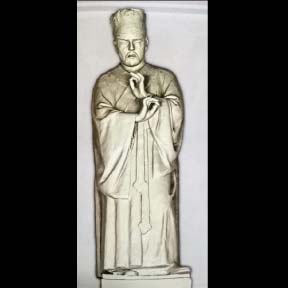It is really amazing and exciting to uncover that among the eight sculptures of world-famous jurists at the Old Senate Session Hall in Manila was one of Li Si (李斯), famous Chinese legalist and prime minister in the Qin (秦) Dynasty (221-207 BC).
The other seven were Pope Leo XIII, the intellectual pope who helped lay the church’s position in modernity; William Blackstone, an 18th century English judge who published a famous treatise on laws; Hugo Grotius, a 17th century Dutch jurist; Justinian the Great, whose rewriting of Roman law became the basis for modern civil law; Woodrow Wilson, the president of the United States from 1913 to 1921; Charlemagne, who helped lay the foundation of Western European culture and modern government; and Manu Needhi Cholan, a legendary Indian king considered a symbol of justice and fairness.
These details are found in Santiago Abano Pilar’s coffee-table book The Life and Art of Isabelo Tampinco (Vibal Foundation and National Museum, 2014). The sculpture of Li Si and those of the other seven jurists were the works of the great sculptor Isabelo Tampinco (1850-1933) and his sons Angel and Vidal. Tampinco was a Chinese mestizo born in Binondo. We will have more on him in the future. For now, we focus on Li Si to give people an idea why he occupied a place in the pantheon of renowned jurists at the Old Senate Session Hall.
Li Si (280-208 BC) was a native of Shang Cai (上蔡) of State Chu (楚) – what is now Henan province) – during the Warring States period (475 -221 BC). A famous statesman, literati and calligraphist, he would be honored as 千古一相 (the prime minister through the ages).
Li Si started as a low-ranking municipal official. He studied the art of governing under the famous legalist scholar Xun Zi (荀子).
But after he accomplished his studies, he realized that the king of State Chu couldn’t do something worthwhile. So he decided to go west to State Qin (秦), hoping to make a difference.
Before he left, Li Si bade his mentor farewell. At the time, the King of Qin was harboring the ambition of annexing other states in a bid to become the emperor of the whole of China. It was the perfect opportunity for a layman intellectual like Li Si to give full play of one’s talent. He declared: “The greatest insult for people on earth is to be too content with one’s low position, and the greatest pity is to be too content with one’s poor condition.” The king of Qin was open-minded. He willingly accommodated worthy personages and adopted their advice and suggestions, including Li Si’s.
One of the schemes Li Si suggested was for the king to send advisers to the other six states of Warring States Period to lobby their kings in order to sow discord and drive a wedge between the kings and ministers of those states and set one against another. In short, divide and conquer. As reward, Li Si was appointed guest minister of the king.
Before long, a minister of Qin royal court advised the king to expel all the guest ministers for different states, insinuating that they were lobbyists of other states’ kings to sabotage the Qin state. A guest minister himself, Li Si did not escape suspicion. He wrote the king to remonstrate with him not to expel the guest ministers with the following excellent explanation: “Tai Mountan (泰山) doesn’t let go its soil, that is why it became high; rivers and seas do not choose small creeks, that is why they become deep; products not produced in Qin, many are treasures; scholars who grew up in Qin, a lot are loyal.”
He enumerated the great contributions of guest ministers to Qin and warned the king that were he to expel them, it would be lending army to the enemy, giving provisions to big states, which would weaken itself internally and make enemies externally.
Heeding Li Si’s advice, the king decided against issuing the expulsion order and retained Li Si as his guest minister.
With Li Si’s help, the King of Qin not only was able to unify China but he also became the first great emperor of China – Qin Shi Huang (秦始皇). Li Si helped the emperor enact laws that abolished the system of enfeoffment (persons were given land in exchange for a pledge of service), established administrative local government system, and strengthened the unitary authoritarian government system that unified China as well as its writing and measuring systems.
He became the prime minister of the first great Chinese emperor and was honored as the prime minister through the ages.
No wonder Li Si was similarly honored in the Philippines!
